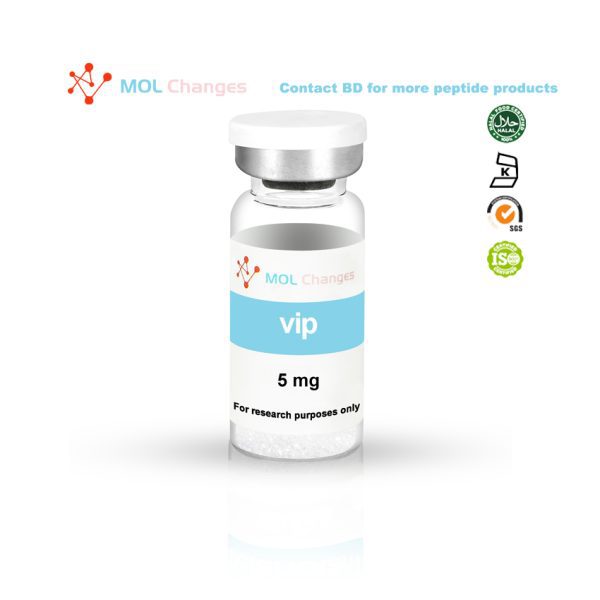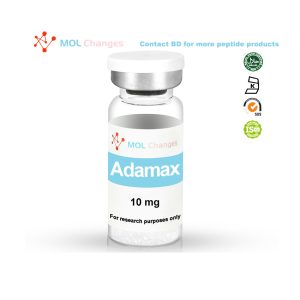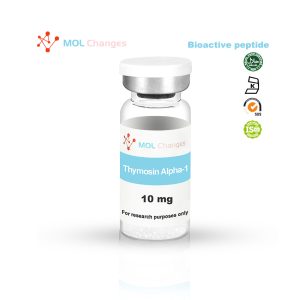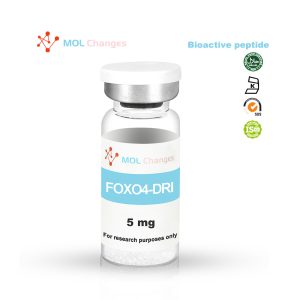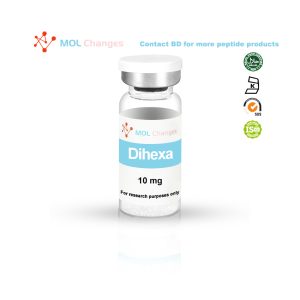Vasoactive intestinal peptide (VIP, vasoactive intestinal peptide, PHM27) is a short peptide hormone produced in the intestine, pancreas, and brain of most vertebrates, including humans.VIP binds to class II G-protein-coupled receptors and is known to
- increase the breakdown of glycogen in the liver and muscle.
- lowering blood pressure.
- relaxing smooth muscle throughout the gastrointestinal tract.
- stimulating contraction of the heart muscle (by increasing heart rate and contraction strength).
- stimulating water secretion in various regions of the gastrointestinal tract.
- affects vaginal lubrication.
- regulates the release of prolactin.
- Protecting cartilage.
- protecting neurons from ischemia and oxidative stress.
- affects autonomic function, and helps synchronize the central nervous system (especially neurons in the supraoptic nucleus) with light signals that regulate circadian rhythms.
For these and many more reasons, VIP has long been of research interest. There is a vast amount of scientific literature on this particular peptide, making it nearly impossible to cover all aspects of VIP’s research. Below is a summary of some of the key points, including the most important aspect of VIP research – the discovery that VIP reduces inflammation and fibrosis in many different organs.
Sequence
HSDAVFTDNYXRLRKQMAVKKYLNSXLN
CAS Number
37221-79-7
Molecular Formula
C147H237N43O43S
Molecular Weight
3325.83
It turns out that one of the main generators of VIP is the immune nerve fibers in the central and peripheral nervous systems and in the blood vessels of the heart. Additionally, VIP is produced directly by immune system cells and helps promote a Th2-type response that reduces inflammation and calms the immune system. VIP and its derived analogs have been extensively studied as potential inflammatory mediators in intestinal diseases, heart disease, and neuroinflammatory diseases.
Various roles of VIP in immune regulation:
In the context of inflammatory bowel diseases (IBD) such as Crohn’s disease and ulcerative colitis, VIP has been found to improve intestinal barrier homeostasis and reduce inflammation driven by Th1 cell action. In particular, the latter approach appeared to generate T cells capable of producing the inflammation-suppressing peptide IL-10. In recent years, it has become apparent that Th1 inflammation is one of several important pathways in IBD.
The benefits of improving intestinal barrier function should not be underestimated as it is thought to be a contributing factor in the pathogenesis of inflammatory bowel disease. In particular, it is thought that impaired barrier function leads to an increase in antigenic material in the intercellular space, making it more likely to interact with immune cells and trigger an inflammatory response. Therefore, mitigating antigen presentation to immune cells by improving barrier function secondary to VIP would reduce one of the first steps in the cascade of events thought to lead to colitis and severe inflammatory bowel disease.
Effect of vasoactive intestinal peptide on lung function
VIP affects lung function in at least two ways. In the first mechanism, VIP regulates pulmonary vascular remodeling in response to inflammation. It appears to have this effect by inhibiting a peptide called NFAT, which activates T cells and causes increased inflammation. Consistent with its role in regulating inflammation in other tissues, VIP appears to control T cell-mediated lung inflammation, a process that has so far been difficult to address in inflammation models. In particular, NFAT inhibition may play a very important role in preventing pulmonary fibrosis, which is the end-stage of many inflammatory diseases, such as chronic obstructive pulmonary disease, sarcoidosis, etc. Therefore, VIP may provide a very useful mechanism to prevent end-stage lung disease that can only be cured by transplantation and that often results in severe morbidity and even death.
VIP also appears to inhibit the proliferation of smooth muscle in lung tissue. Smooth muscle cell proliferation is one of the long-term consequences of lung inflammation and is a particular problem in long-term uncontrolled bronchial asthma. VIP is expected to provide a mechanism to mitigate the effects of long-term inflammation secondary to asthma.
There is also specific evidence that the vasodilatory effects of VIP, known to help control blood pressure, may have highly potent effects on the pulmonary vasculature. Preliminary studies suggest that VIP significantly reduces pulmonary artery blood pressure, thereby increasing cardiac output and improving venous oxygen saturation. While more work remains to be done, VIP holds promise as a new way to improve lung function in primary vascular disease.
VIP in port
One of the major problems with organ transplants is rejection by the body’s immune system. No matter how good the match between donor and recipient, the body will react to the transplanted organ, ultimately leading to the destruction and failure of the transplanted organ. Currently, the only solution to this problem is the use of broad-spectrum anti-inflammatory drugs. Unfortunately, these drugs can lead to susceptibility to serious infections and have their own side effects, such as scarring and organ fibrosis, which may limit their use.
VIP studies have shown that this peptide affects dendritic cells (DCs). DCs are important in immune responses because they help the body recognize antigens and take appropriate countermeasures. By reducing DC proliferation and activation, VIP helps stop immune responses before they occur. Interestingly, this function appears to benefit dendritic cells attached to tolerogenic antigens. In other words, VIP selectively inhibits DC proliferation that may cause autoimmune responses. This is an active area of research because VIP may reduce transplant rejection while reducing infection-promoting side effects. This could allow VIP or its analogues to form the basis of future anti-rejection drugs for transplantation.
VIP as a neuroprotectant
The role of VIP in the central nervous system is threefold: neurotransmitter, neurotrophic/neurogenic, and anti-inflammatory/neuroprotective. As in the gut, VIP’s role in the CNS begins with barrier maintenance. In this case, the peptide helps maintain the very critical function of the blood-brain barrier (BBB). The BBB is a protective layer of cells between blood vessels and central nervous system tissues. It regulates what enters nervous tissue, thereby controlling everything from nutrition and oxygenation to immune function. Impairment of the BBB has been implicated in the pathophysiology of multiple sclerosis, encephalomyelitis, and even stroke.
VIP has also been shown to modulate beta-amyloid accumulation in mouse models of Alzheimer’s disease and is known to have neuroprotective effects in Parkinson’s disease. There is also evidence that VIP is an important neuroprotectant in the developing brain, helping to prevent excitotoxic white matter damage and improve neuronal fatty acid myelination. In the context of Parkinson’s disease, VIP appears to provide similar benefits as in other inflammatory settings by shifting the immune balance away from an inflammatory Th1 response toward an anti-inflammatory Th2 response.
The exact role of VIP in Alzheimer’s disease (AD) is unclear. Studies have shown that the processing of VIP is inhibited in AD and that people affected by AD have lower levels of peptide and amino acid by-products in the brain. Again, the research is unclear at this time, but when VIP was injected into the brains of mice, beta-amyloid levels were significantly reduced, demonstrating that this peptide plays an important role in the pathophysiology of the disease.
The CNS protective effects of VIP appear to be mediated through VPAC1 and VPAC2 receptors. In both cases, stimulation appears to lead to increased secretion of neurotrophic factors such as ADNP (activity-dependent neurotrophic factor) and BDNF (brain-derived neurotrophic factor). Both peptides help protect synapses and astrocytes.
cardiac fibrosis
Like lung disease, fibrosis is the end stage of many different heart diseases. Cardiac fibrosis can cause many serious problems, including valve dysfunction, decreased contractility, changes in cardiac filling, and electrical problems. Like lung disease, cardiac fibrosis is a common end-stage event in many heart diseases and often requires transplantation to avoid death.
To date, most heart research has focused on preventing scarring. Many commonly used medications can help, at least to some extent, to slow down the heart-remodeling process that causes scarring. Unfortunately, few cases are 100% successful, and most people experience progressive fibrosis and decreased heart function. However, recent studies in rats have shown that VIP not only slows down fibrosis but also reverses scarring. It appears that this effect is mediated, at least in part, by a substantial reduction in the expression of angiotensinogen and angiotensin receptor type 1a. This makes sense, as angiotensin receptor blockers and ACE inhibitors have long been known to slow cardiac models/fibrosis and are actually the first line of defense against fibrosis.
Vasoactive intestinal peptide and COVID 19
An interesting recent development in Switzerland and the United States suggests that a synthetic version of VIP called aviptadil (RLF-100) may help reduce lung complications in severe cases of Covid 19. Aviptadil, like VIP, inhibits the production of pro-inflammatory cytokines. In the lungs, this translates into protection of type 2 alveolar cells, which are responsible for the bulk of the oxygen exchange that occurs in the lungs. In fact, Aviptadil appears to actually prevent the SARS-2 coronavirus from penetrating these cells and infecting them. A Phase 2/3 placebo-controlled trial is currently underway to investigate the effectiveness of this VIP derivative in preventing severe complications of COVID 19.
According to Dr. Jonathan Javitt, CEO of NeuroRX (NeuroRX has partnered with the manufacturer of aviptadil to accelerate the development and use of the drug in the treatment of COVID-19), patients on ventilators and ECMO are experiencing increased risk of COVID-19. Recovery is rapid in just three days after ECMO treatment. RLF-100. This is true even in patients with severe comorbidities. These drugs are administered on an emergency basis to patients who are too ill to participate in clinical trials. Dr. Javitt noted that currently no antiviral drug can speed recovery from infection and inhibit viral replication as well as Aviptadil.
Vasoactive intestinal peptide and COVID 19
VIP is a member of a larger group of neuropeptides and endocannabinoid peptides. It has been shown to have multiple effects on the central nervous system, gastrointestinal tract, lung tissue, and immune system. It is known to play an active role in embryonic growth and development.
Studies show that VIP helps reduce systemic inflammation and is particularly useful in treating neurodegenerative diseases, pulmonary fibrosis, inflammatory bowel disease, and cardiac fibrosis. This peptide appears to be highly potent in many fibrotic pathways and may provide therapeutic benefits in common fibrotic processes that cause so much morbidity and mortality.
In addition to its antifibrotic effects mediated through anti-inflammatory effects, VIP is a potent immune system modulator and general anti-inflammatory agent. The peptide has also been shown to protect the central nervous system from damage and has received widespread attention for its ability to preserve cognitive function in neurodegenerative diseases.
Finally, a synthetic version of VIP shows promise in treating COVID 19 and has been fast-tracked by the FDA into Phase 2/3 clinical trials. This could ultimately be beneficial for other VIP-related treatments, as evidence from successful clinical trials could help inform future clinical trials and provide an incentive for pharmaceutical companies to pursue treatments that are more likely to be approved for use in humans. The next decade is likely to bring a lot of innovation and research into vasoactive intestinal peptide.
COA
HPLC
MS
- E. Gonzalez-Rey and M. Delgado, “Role of vasoactive intestinal peptide in inflammation and autoimmunity,” Curr. Opin. Investig. Drugs Lond. Engl. 2000, vol. 6, no. 11, pp. 1116–1123, Nov. 2005.
- M. Delgado, D. Pozo, and D. Ganea, “The Significance of Vasoactive Intestinal Peptide in Immunomodulation,” Pharmacol. Rev., vol. 56, no. 2, pp. 249–290, Jun. 2004, doi: 10.1124/pr.56.2.7.
- S. Seo et al., “Vasoactive intestinal peptide decreases inflammation and tight junction disruption in experimental necrotizing enterocolitis,” J. Pediatr. Surg., vol. 54, no. 12, pp. 2520–2523, Dec. 2019, doi: 10.1016/j.jpedsurg.2019.08.038.
- E. Gonzalez-Rey and M. Delgado, “Therapeutic treatment of experimental colitis with regulatory dendritic cells generated with vasoactive intestinal peptide,” Gastroenterology, vol. 131, no. 6, pp. 1799–1811, Dec. 2006, doi: 10.1053/j.gastro.2006.10.023.
- S. I. Said, “The vasoactive intestinal peptide gene is a key modulator of pulmonary vascular remodeling and inflammation,” Ann. N. Y. Acad. Sci., vol. 1144, pp. 148–153, Nov. 2008, doi: 10.1196/annals.1418.014.
- A. M. Szema et al., “NFATc3 and VIP in Idiopathic Pulmonary Fibrosis and Chronic Obstructive Pulmonary Disease,” PloS One, vol. 12, no. 1, p. e0170606, 2017, doi: 10.1371/journal.pone.0170606.
- “Vasoactive Intestinal Peptide – an overview | ScienceDirect Topics.” https://www.sciencedirect.com/topics/neuroscience/vasoactive-intestinal-peptide (accessed Jan. 01, 2021).
- V. Petkov et al., “Vasoactive intestinal peptide as a new drug for treatment of primary pulmonary hypertension,” J. Clin. Invest., vol. 111, no. 9, pp. 1339–1346, May 2003, doi: 10.1172/JCI17500.
- A. Chorny, E. Gonzalez-Rey, and M. Delgado, “Regulation of dendritic cell differentiation by vasoactive intestinal peptide: therapeutic applications on autoimmunity and transplantation,” Ann. N. Y. Acad. Sci., vol. 1088, pp. 187–194, Nov. 2006, doi: 10.1196/annals.1366.004.
- D. R. Staines, E. W. Brenu, and S. Marshall-Gradisnik, “Postulated vasoactive neuropeptide immunopathology affecting the blood–brain/blood–spinal barrier in certain neuropsychiatric fatigue-related conditions: A role for phosphodiesterase inhibitors in treatment?,” Neuropsychiatr. Dis. Treat., vol. 5, pp. 81–89, 2009, Accessed: Jan. 01, 2021. [Online]. Available: https://www.ncbi.nlm.nih.gov/pmc/articles/PMC2695238/.
- F. R. O. de Souza, F. M. Ribeiro, and P. M. d’ Almeida Lima, “Implications of VIP and PACAP in Parkinson’s disease: what do we know so far?,” Curr. Med. Chem., Mar. 2020, doi: 10.2174/0929867327666200320162436.
- O. T. Korkmaz et al., “Vasoactive Intestinal Peptide Decreases β-Amyloid Accumulation and Prevents Brain Atrophy in the 5xFAD Mouse Model of Alzheimer’s Disease,” J. Mol. Neurosci. MN, vol. 68, no. 3, pp. 389–396, Jul. 2019, doi: 10.1007/s12031-018-1226-8.
- P. Gressens, L. Besse, P. Robberecht, I. Gozes, M. Fridkin, and P. Evrard, “Neuroprotection of the developing brain by systemic administration of vasoactive intestinal peptide derivatives,” J. Pharmacol. Exp. Ther., vol. 288, no. 3, pp. 1207–1213, Mar. 1999.
- R. L. Mosley et al., “A Synthetic Agonist to Vasoactive Intestinal Peptide Receptor-2 Induces Regulatory T Cell Neuroprotective Activities in Models of Parkinson’s Disease,” Front. Cell. Neurosci., vol. 13, p. 421, 2019, doi: 10.3389/fncel.2019.00421.
- M. Yasuda, K. Maeda, T. Kakigi, N. Minamitani, T. Kawaguchi, and C. Tanaka, “Low cerebrospinal fluid concentrations of peptide histidine valine and somatostatin-28 in Alzheimer’s disease: altered processing of prepro-vasoactive intestinal peptide and prepro-somatostatin,” Neuropeptides, vol. 29, no. 6, pp. 325–330, Dec. 1995, doi: 10.1016/0143-4179(95)90003-9.
- R. H. Perry, G. J. Dockray, R. Dimaline, E. K. Perry, G. Blessed, and B. E. Tomlinson, “Neuropeptides in Alzheimer’s disease, depression and schizophrenia. A post mortem analysis of vasoactive intestinal peptide and cholecystokinin in cerebral cortex,” J. Neurol. Sci., vol. 51, no. 3, pp. 465–472, Sep. 1981, doi: 10.1016/0022-510x(81)90123-4.
- K. A. Duggan, G. Hodge, J. Chen, and T. Hunter, “Vasoactive intestinal peptide infusion reverses existing myocardial fibrosis in the rat,” Eur. J. Pharmacol., vol. 862, p. 172629, Nov. 2019, doi: 10.1016/j.ejphar.2019.172629.
- C. Smith, BGR, Aug. 03, 2020. https://bgr.com/2020/08/03/coronavirus-cure-rlf-100-aviptadil-phase-3-trial/ (accessed Jan. 01, 2021).
Article/Literature Citation Notes
The purpose of quoting the scientist and professor's article is to acknowledge, recognise and applaud the exhaustive development work that has been done to undertake this peptide research. The scientist does not in any way support or advocate the purchase, sale or use of this product for any reason, and MOL Changes has no affiliation or relationship, implied or otherwise, with the scientist.
warning
These products are intended for scientific purposes only for in vitro research and are not to be used for human, animal or unethical experiments, in vitro research (Latin: in glass) is conducted in vitro. These products are not drugs and are not approved by the Food and Drug Administration in any country for the prevention, treatment or cure of any medical condition, disease or illness. The introduction of this product into humans or animals in any form is strictly prohibited by law.


